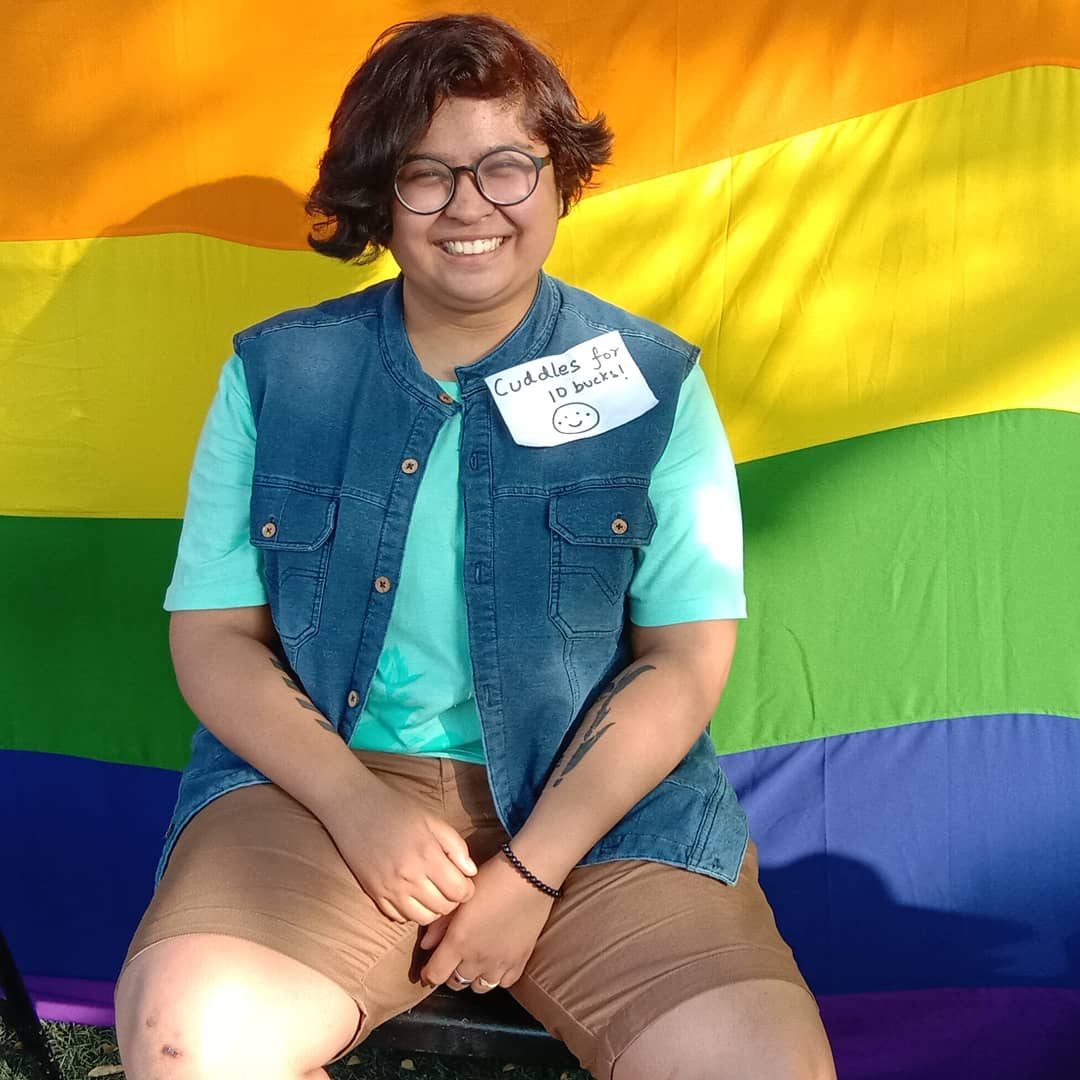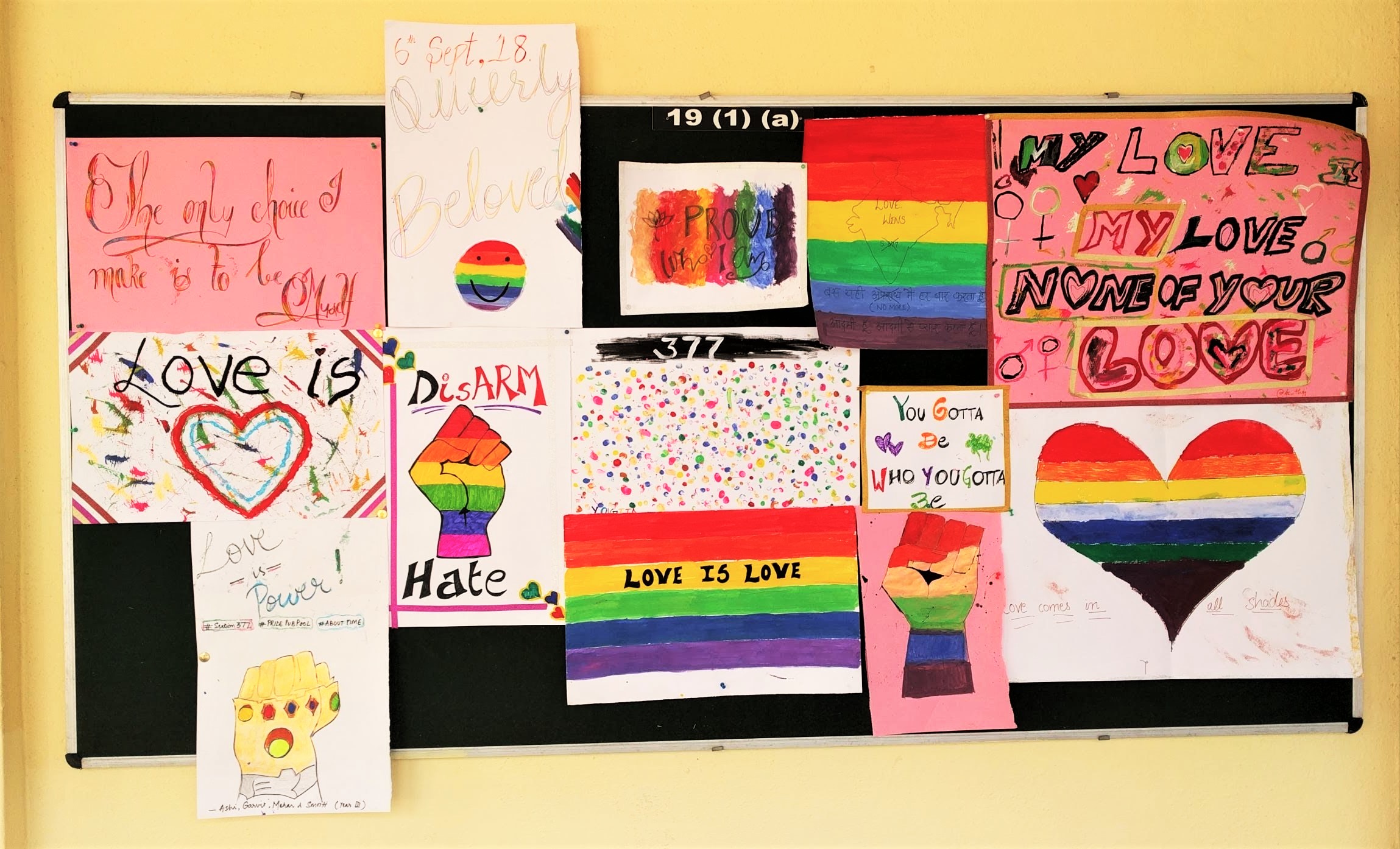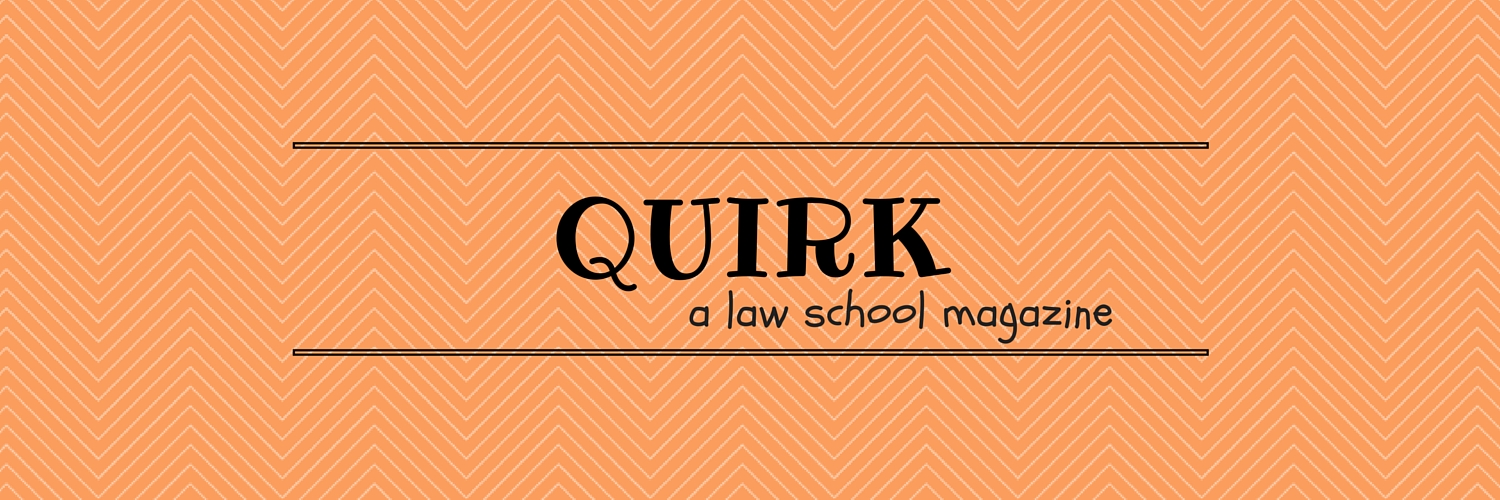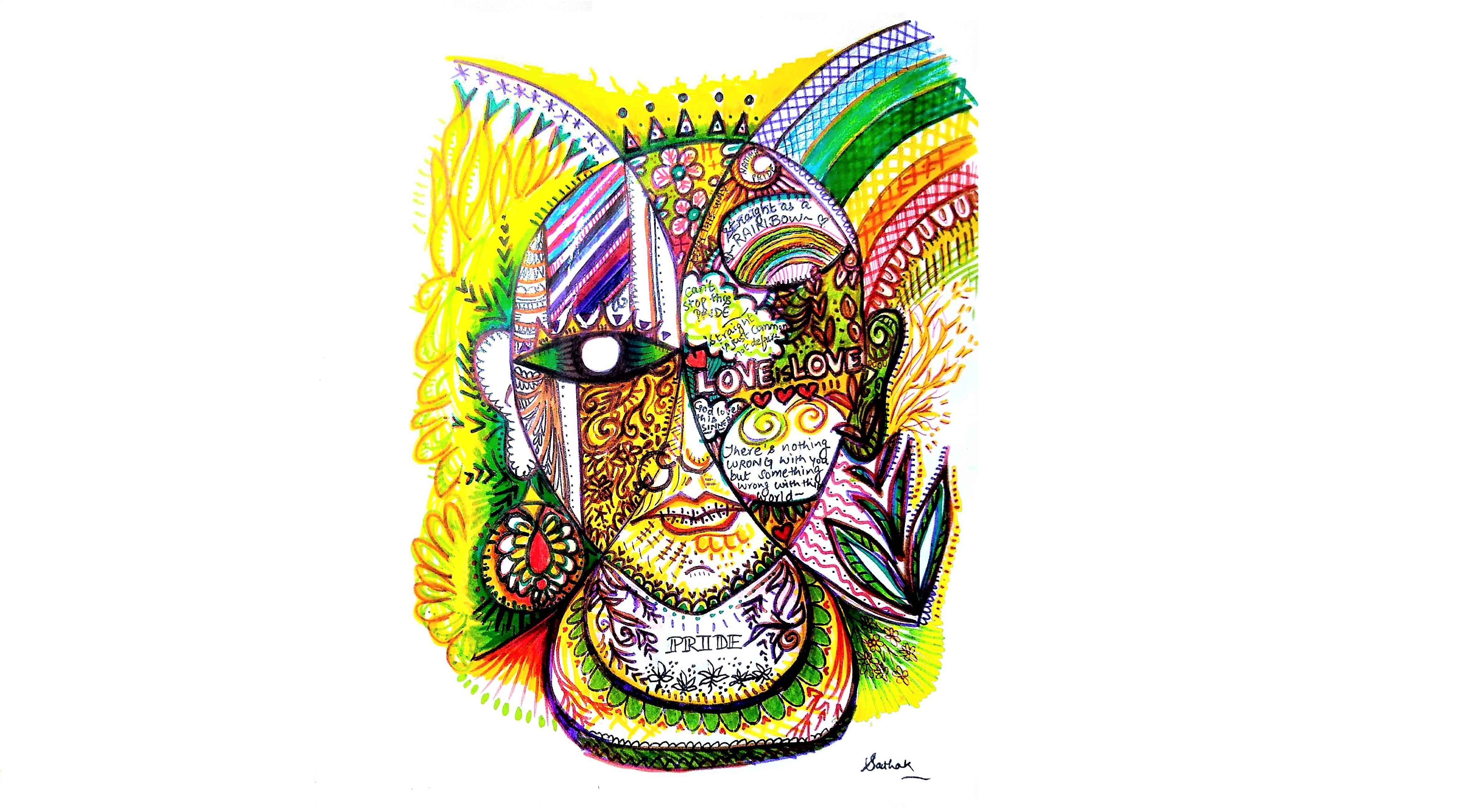A survey conducted on campus by the NLS Queer Alliance (hereafter ‘QA’) revealed that out of 96 respondents, 23% did not identify as straight and around 10% did not identify as cisgender.[1] This shows that the queer community on campus is not composed of a ‘minuscule minority’. In celebration of Pride Month (which recently concluded) Quirk presents this Mini-Series containing a collation of the personal experiences of some LGBTQIA+ members on campus. This includes their journey before Law School, the acceptance of their identity, their favourite moments and terrible experiences on campus, and views on what would make the campus more inclusive! (This compilation is in no way representative of the entire LGBTQIA+ community in college).
Part 1 of this Mini-Series highlights the fact that NLS is not entirely the safe space we aspire for it to be, and that the heteronormative order in college could do with some much-needed introspection.
The artwork was submitted by Sarthak Wadhwa (Batch of 2024) for Pride Month.[2]
The authors below have mainly responded to these five questions:
1. Did you know a lot about the LGBTQIA+ Community before coming to college? Did college help your growth and help you figure out your identity in any way?
2. Are you out at home? With respect to your identity, how does it feel to be who you are at college and at home?
3. What has been your favourite moment at college?
4. Have you had negative experiences at college because of your identity?
5. What do you think could make college more inclusive?
Some students have chosen to be anonymous, but with some descriptors provided with their consent. Various aspects of all the authors’ identities such as caste, class, able-bodiedness, religion, native place, and education have been mentioned below, with their consent. This is so that readers can understand how a person’s experience is shaped by all aspects of their identity as a whole and how this impacts their gender identity and sexual orientation as well.
Mandira Mhaskar is a second year student. She identifies as queer. She is an upper-class Brahmin, who received English medium education, comes from a small town, and is able-bodied.

People who know me superficially think I’m like my mother, but if you better get to know me, you’ll realize I’m like my father. At least that’s what my dad said a couple of weeks later when I came out to them – “clearly, you’re like me, because you like girls, and so do I”. Not everyone is privileged enough to have their father joke about genes and sexuality that way. Clearly, I’m very privileged. I won’t say my parents embraced me with open arms when I came out to them – that took them a couple of months – but now my dad and I check out women together, of course, in my mother’s absence.
Coming from a privileged background, NLS was a culture shock to me because I heard someone use the term “faggot” for the very first time, and a lot of people just laughed it off. After spending a few weeks here, I realised that the Law School community can be divided into four Cartesian quadrants: homophobic people with a strong gaydar, homophobic people with a weak gaydar, allies with a strong gaydar, and allies with a weak gaydar.
I’ve mostly interacted with people who have a strong gaydar, of both kinds. I’ve always been out and proud, and I’ve always found the courage to call the strong mighty women of NLS beautiful. Now, the allies have been sweet with a “thank you” as a response, but the homophobes have gone behind my back, bitched about me, and assumed I was into them. Now that’s interesting, because I tell my stupid friends they look good when they do, but that doesn’t transform my platonic love for them into something else.
Homophobes at NLS are undoubtedly the most interesting people. You’ll never realise who they are until they waffle in front of someone you’re closer to and they’re not. Given how eloquent and “woke” most NLS studs are, you expect them to show empathy, but empathy at NLS is something you can’t expect. At least from a great chunk of people. Queer people like me have zero social and political capital. We’re always on the sidelines unless we’re exceptionally good at something, and if we are, then assume we’re closeted, because the moment we come out of the closet, the social capital is gone. Friendships are rare, and support even rarer. In fact, often people who claim to be queer activists are the hardest to approach. And should you be a naive queer, I assure you, people will either use you, or closeted folks will sexually harass you. You assume that other queers will support you, but that seems like a far-fetched dream on most days.
I know being queer at NLS sounds rather grim, but there is always a silver lining even to the darkest cloud. Liberation at NLS is two-fold. One, given how liberal the space is, your gender expression and sexual expression has the freedom to exist in the purest form. The way some men turn up to classes in boxers similarly, you can wear a suit to your freshers and pull it off, like I did. You’re free to break all norms. Two, people are indifferent to whose hand you’re holding. You’re more than welcome to experiment and figure out what your sexuality and gender expression are, with the caveat that you still have to be wary of some folks. You have enough leeway to fall in love with yourself and a person of the same gender, if you’d like. There is a queer idol to look up to, the one and only Professor Ambasta, we’ve had Professor Elizabeth vocally advocating queer and women’s rights, and we have the kind of legacy that is maintained by Professor Sarasu (now the Registrar at NLS) – this will help you on your journey of self-discovery, and makes the silver lining at NLS brighter.
My journey as an openly queer person in Law School has been very dramatic because of the kind of responses I’ve received. But I’ve been very lucky in terms of the friends I’ve made because they’ve been nothing but extremely supportive. They’ve helped me get ready for a date, they’ve bitched about heterosexuals when they’re themselves heterosexual. It’s been a funny ride, like a sine theta graph, but I wouldn’t trade it for anything else.
X believes in gender and sexual fluidity, but if you had to slot them into a label, they would say bisexual. They are AMAB, they are in their fourth year, a member of QA and LawSoc, and have been extremely vocal on social issues on campus. They are upper class, upper caste, from a small city, went to a mediocre private school, are challenged by high myopia and low vision, born into a Sanatan Hindu family but they don’t identify as such.
I was not a queer affirmative individual before I joined Law School. I definitely knew I was different and was not a masculine straight man but I wasn’t very confident about it and I hadn’t accepted myself when I joined Law School. Romance was not on my priority list before college, and the idea of exploring didn’t enthral me as much. But as I entered Law School, I felt that I was far more autonomous now. I was in a totally new metro city, where I was afforded a lot of privacy in the sense that I could be anonymous. I could keep my things secret, and I could also see visible queer individuals around me. In my first trimester itself, I got on gay dating apps. The slow process of affirmation and acceptance started with Law School, which helped me immensely.
I was accidentally outed at home – my sister saw something on my phone once, by mistake. But she was very empathetic and kept it from my parents. By the end of second year, I felt comfortable talking about it with my mother, who basically went into denial. She wasn’t aggressive – it didn’t become a situation of hyperventilating drama or anger – but she did deny it and say that it was just an outcome of my activism and wanting to be different from the crowd. She kept it from my father as well. In my third year, when my parents and I were on a trip, I told my father. He was initially slightly more aggressive than my mom but it took him around 20 hours to come around and say “it’s your life, do what you want, we don’t mind … I am sorry for not giving you the space to open up earlier” and all that. He also apologised for being aggressive when I told him. So, I am out to my immediate family.
I was never at home long enough (before the lockdown) to deal with my identity and how it was received. But whenever I was at home, I wasn’t very comfortable. Over time, I became adventurous and stopped caring if someone got to know or if relatives/acquaintances saw anything. But I was slightly more inhibited from the idea of meeting people or dating on the app than I was in college. But the degree of comfort I feel with my surroundings, with my parents around is almost similar, because that’s not the elephant in the room at any time. In college, there are fewer than ten people, who have now come to know about my identity – in the last 6-10 months. That way I don’t see a big difference in the level of comfort or community that I feel in college or at home.
I have had two favourite queer moments at college. I still think being queer in Law School is associated with a lot of shame and exclusion. The way people will choose to associate with you could change or maybe it comes from a question of fear, but I think there is a truth to that fear as well. So that is why I felt very liberated when the Navtej Singh Johar judgement came out on September 6, 2018, and we had a pub pool. I remember I was the only second year at the party (it was also because I was not mooting) and I was happily enjoying the party. However, after the party, I did hear some rumours going around in the hostels – regarding why I was the only second year there, and the fact that people felt that I was “too liberated after the judgement”. This can be very bothersome for anyone who is especially inside the closet, but still, the idea that I could enjoy the party made me feel good. I enjoyed it when I could, what I should have.

A second, very special memory was the 2018 Pride March, which was my first one. I really felt the sort of diversity within the community, the sort of vibrance in the community, and I felt that I belonged in a certain special way with certain special people. I was also very happy when I joined QA in my third year – when I finally found the courage to apply and be named as one of the members in that email. That also gives away a lot and so even getting into QA was a feeling of happiness and some accomplishment. It was a personal journey of courage that I have travelled.
There is something that I have always felt could make college more inclusive and welcoming of queer identities. The burden of assimilation or inclusion should always be there on the heteronormative order. It cannot be on the Queer folx in college. So what do I mean by that? When we have CR elections, the SBA inadvertently mentioned “boy and girl CR” – these are small terms that can matter a lot. When we address groups of people, I think it is very important to use “folx” because the way we talk about “guys” references bro culture, and the gags of hyper-masculine males become the sort of bond that we’re talking about. And I don’t think it’s that sort of bond we should be aiming for in campus culture, even if we use that word. The way we think about the NLS Ball, or the way we talk about relationships and hook-up culture on campus – all reflect this heteronormative order. I remember in the first year we had this Scavenger Hunt, and we had to ask some senior what was the strangest thing they had seen at a Law School party. This one guy said “oh I saw two girls making out” – so you see how it is perceived as a strange thing for girls to be making out. I think far more introspection, far more thinking about issues of gender and sexuality could really help the heteronormative order in college to reform itself.
Obviously what the queer community can do is to assert its power and this they should continue doing – for instance, QA should remain even more active, we can have more sensitisations, we can do all of that. But an active attempt is needed by the heteronormative order – even if it’s for MeToo or any other thing – to understand there is more to it than the male-female binary or a heterosexual relationship, or a heterosexual. This is not something that they should be doing to become woke or be good or get cherry points – it’s an obligation that they have. So it shouldn’t be about someone else being there to tell them – it should be their duty and not their gesture of goodwill to think about these things.
___________________________________________________________________
[1] The National Law School Queer Alliance was founded in 2015 as a support group for queer students on campus. To make the campus a more queer-friendly place, they have organised various support group meetings, gender and sexuality sensitisation workshops, movie screenings, pub pools, transport to the Namma Pride Parades and interactive talks by activists from the community. The Alliance now goes beyond that initial mandate, and works to further queer and allied causes, particularly in the field of education.
[2] Artwork Description: Last year’s Pride was organised in protest of the regressive TransAct, which made self-identification and self-expression subject to the approval of the law – departing significantly from the landmark NALSA Judgement. The Namma Pride March, with the myriad of appearances, attires and expressions sported by the folx who attended it – was unperturbed by the restrictive constructs of gender roles, societal expectations and the backward law. That is what inspires this piece – to be something as unique, intricate, diverse and bold as the people who stood together and marched across the city in November.
The androgynous subject of this piece bears the Trans Flag (for the March against the Trans Act) as well as the Asexual and Bisexual Flags (to honour and represent the members of the NLS community who were present there) – on the forehead. There are floral motifs all over the piece, with several quotes that were seen and heard on the day emblazoned on the right side of the picture. The word “Pride” is featured on the throat of the subject to represent the irrepressible ‘voice’ of the queer community. The picture is also very colourful, with rainbows.


Comments